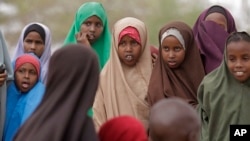Kenyan authorities have begun a mass vaccination of girls against the human papilloma virus, HPV, which causes cervical cancer. According to the World Health Organization, the East Africa region has the highest rate of cervical cancer in the world.
Kenya officially launched its HPV vaccination program Friday in the coastal town of Mombasa.
The vaccine will be administered free to all 10-year-old girls as part of the country's routine immunization schedule. Girls will get the vaccine in two doses, six months apart.
President Uhuru Kenyatta termed the vaccine roll-out a major milestone in the fight against non-communicable diseases.
"Access to the HPV vaccine by our girls will lead to the reduction of number of new cervical cancer cases and secure lives of our daughters and sisters," he said. "This means that our young women who are critical to the future of our nation will be protected from early deaths."
Kenya's Ministry of Health says the vaccinations will cost about $7.7 million this year.
Dr. Collins Tabu, head of the National Vaccine Immunization Program in Kenya, touted the benefits of the program in a talk with reporters.
"The introduction of HPV vaccine within our setup has potential to cut back the burden of cervical cancer by close to 70 percent," Tabu said. "If we achieve a good enough coverage, of about 80 percent."
He said at least seven women die every day through cervical cancer in Kenya.
"The human papilloma virus, the most common sexually transmitted disease with a prevalence of close to 50 percent within our borders, is the primary cause of more than 99 percent of all of the cervical cancers. There is a direct link, as we know today," he said.
At least 115 other countries routinely administer the vaccine, including Uganda, Tanzania and Rwanda. Tabu said because of the vaccine, Rwanda has nearly eliminated cervical cancer.
Kenya has moved more slowly, possibly because of debates around the safety of vaccines. Earlier this decade, the Catholic Church in Kenya called for a boycott of a polio vaccination drive.
"It's a bit embarrassing that Kenya may be the last or second last East African country to introduce the vaccine that is supposed to protect our girls against cervical cancer," Tabu said.
During Friday's launch, Kenyatta dismissed claims the HPV vaccine might be unsafe, telling the crowd, "Let us not fight science."





